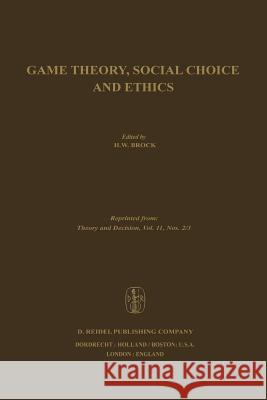Game Theory, Social Choice and Ethics » książka
Game Theory, Social Choice and Ethics
ISBN-13: 9789400995345 / Angielski / Miękka / 2011 / 204 str.
There are problems to whose solution I would attach an infinitely greater import ancf than to those of mathematics, for example touching ethics, or our relation to God, or conceming our destiny and our future; but their solution lies wholly beyond us and completely outside the province 0 f science. J. F. C. Gauss For a1l his prescience in matters physical and mathematieal, the great Gauss apparently did not foresee one development peculiar to OUT own time. The development I have in mind is the use of mathematical reasoning - in partieu lar the axiomatic method - to explicate alternative concepts of rationality and morality. The present bipartite collection of essays (Vol. 11, Nos. 2 and 3 of this journal) is entitled 'Game Theory, Social Choiee, and Ethics'. The eight papers represent state-of-the-art research in formal moral theory. Their intended aim is to demonstrate how the methods of game theory, decision theory, and axiomatic social choice theory can help to illuminate ethical questions central not only to moral theory, but also to normative public policy analysis. Before discussion of the contents of the papers, it should prove helpful to recall a number of pioneering papers that appeared during the decade of the 1950s. These papers contained aseries of mathematical and conceptual break through which laid the basis for much of today's research in formal moral theory. The papers deal with two somewhat distinct topics: the concept of individual and collective rationality, and the concept of social justiee."











